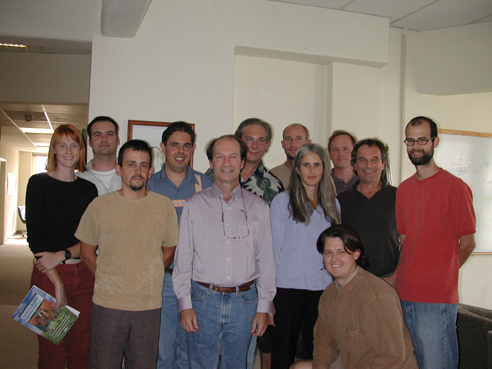NCEAS Working Groups
Global change and infectious disease
Project Description
A major element underlying many emerging and reemerging infectious diseases is environmental change. This may be manifested through direct and intentional landscape changes(e.g. hydroelectric dams, agricultural development projects, irrigation, urban expansion, mining, deforestation), indirect habitat changes that favor transmission (e.g. increased vector breeding sites, evolution of virulence, or enhanced contact with infectious agents), and the possibility that other indirect abiotic effects including climate change might alter the intensity or distribution of various diseases. A better understanding of these processes is needed for risk is to be understood and reduced, and for outbreak forecasts are to be made accurate and credible. The goal of this sub-group is to explore various associations between environmental change and specific infectious diseases that have strong environmental links by analyzing data sets with extensive and well-documented temporal and/or spatial variation.
Specifically, we propose to begin by analyzing two categories of infectious disease. The first is vectorborne disease. Within this category we focus on a mosquito-borne anthroponosis, human malaria, which will be analyzed using data from various sites and sources throughout the world. Time-series analysis and study of spatial patterns among cases and environmental variables will be undertaken using standard time-series and GIS-based statistical models. An attempt will be made to test hypotheses that are based in the biology of vectors, human ecological relations with the environment and each other, and climatic factors that influence transmission.
Diarrheal diseases comprise the second category. Evolutionary theory and empirical studies indicate that diarrheal diseases evolve increased or decreased virulence in response to environmental changes. Specifically, this work suggests that when waterborne routes of transmission are available natural selection will favor highly exploitative pathogen variants because in such environments the costs of exploitation are low. Even ill, immobilized hosts can act as sources of infection because fecal material is removed and washed in water that can contaminate supplies of drinking water. Conversely, if safe water supplies are provisioned, we predict pathogens to evolve toward benignity. There exists a great amount of data in the literature and in unpublished records (e.g., located in ministry of health archives) that we propose to analyze to test this prediction. Our focus in this second category will be on the bacterial agents of dysentery, because the inherent virulence of these agents varies at the species level, and the frequencies of these species in human populations spans the length of time over which water supplies have been improved (i.e., over the past century).

Principal Investigator(s)
Mark L. Wilson, Leslie A. Real
Project Dates
Start: May 4, 2003
End: September 12, 2005
completed
Participants
- Jorge Ahumada
- University of Hawaii
- Menno J. Bouma
- London School of Hygiene and Tropical Medicine
- Andrew P. Dobson
- Princeton University
- Gregory E. Glass
- Johns Hopkins University
- Sunetra Gupta
- University of Oxford
- M. Elizabeth Halloran
- Emory University
- William Hawley
- Centers for Disease Control and Prevention
- Simon Hay
- University of Oxford
- Ellis McKenzie
- National Institutes of Health
- Mercedes Pascual
- University of Michigan
- Andrew F. Read
- University of Edinburgh
- Leslie A. Real
- Emory University
- Mario Recker
- University of Oxford
- Xavier Rodo
- University of Barcelona
- Jeffrey Sachs
- Columbia University
- Burton H. Singer
- Princeton University
- David L. Smith
- University of Maryland School of Medicine
- Katherine F. Smith
- University of California, Santa Barbara
- Mark L. Wilson
- University of Michigan
Products
-
Journal Article / 2009
Assessing the burden of pregnancy-associated malaria under changing transmission settings
-
Journal Article / 2005
Ecological theory to enhance infectious disease control and public health policy
